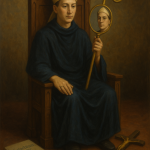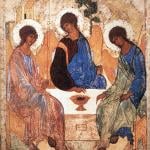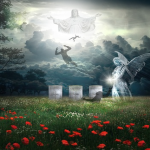THROUGH A MAILBAG DARKLY: Various responses to my post on The Man in the High Castle. I should have made it clear, in the original post, that the novel-within-a-novel (The Grasshopper Lies Heavy) isn’t set in our world, but in yet another alternate reality. I conflated the Grasshopper world with our own world, which two of the characters see in visions/apprehensions. I conflated the two in part because I couldn’t think of anything interesting to say about the differences between them; but as you’ll see, other people made some really intriguing points.
First, Jim Henley and his readers weigh in, with much good comments-boxing, making me want to read quite a bit more PK Dick. Matthew Yglesias comments here.
Bruce Baugh sent me and Jim this quick, intriguing note:
I’m sending this to both Eve and Jim for tidiness’ sake, since neither of you touched on something that I think is very important and very often overlooked or misunderstood in High Castle: the true reality shown to Abendsen isn’t ours. It is a more just history, I think, with Hitler denied the escape of suicide. When I read the book as a teen, I figured, oh, just one more alternate world along with the rest. Now I think that Dick very much intends the readers to see that we too aren’t where we ought to be.
And Michael O’Brien writes (the formating at the end will probably get stripped out by Blogger, for which I apologize):
…I liked your comments a lot. I wanted to note one thing, though–the “real world” in the novel is not our world. It’s close but different. FDR only serves two terms, after which Rexford Tugwell succeeds to the Presidency, and a few decades later America and Britain have their own battle for the throne of the world. I think this is an ingenious move on Dick’s part because it still makes the reader unsure of “reality,” the nature of which he continually questioned in his writing. Also, I think the end of the book shows that the art within the book hasn’t just brought the characters closer to understanding the world, but have actually magically brought them into the world–Julia steps into a taxicab, not a pedecab, a much more humane and real-world type of hired transportation.
You mentioned the Taoist nature of Dick’s work, but you should also check out the Gnostic influence. There’s definitely the element of “God-haunted man,” as you put it, because he really felt, like some versions of Gnosticism, that we were holy but kept unholy by the evil nature of the world, whether it be the Nazis in TMitHC, cops in Scanner Darkly, or the Roman empire’s Black Prison in his last crazy set of works, the VALIS trilogy. It’s not something I entirely share, as a Catholic like you, but it made me get a lot closer to Dick’s personal beliefs. At the start of one of the VALIS books, he quotes Wordsworth:
Our birth is but a sleep and a forgetting:
The Soul that rises with us, our life’s Star,
Hath had elsewhere its setting,
And cometh from afar:
Not in entire forgetfulness,
And not in utter nakedness,
But trailing clouds of glory do we come
From God, who is our home…So I think you’re exactly right here.











